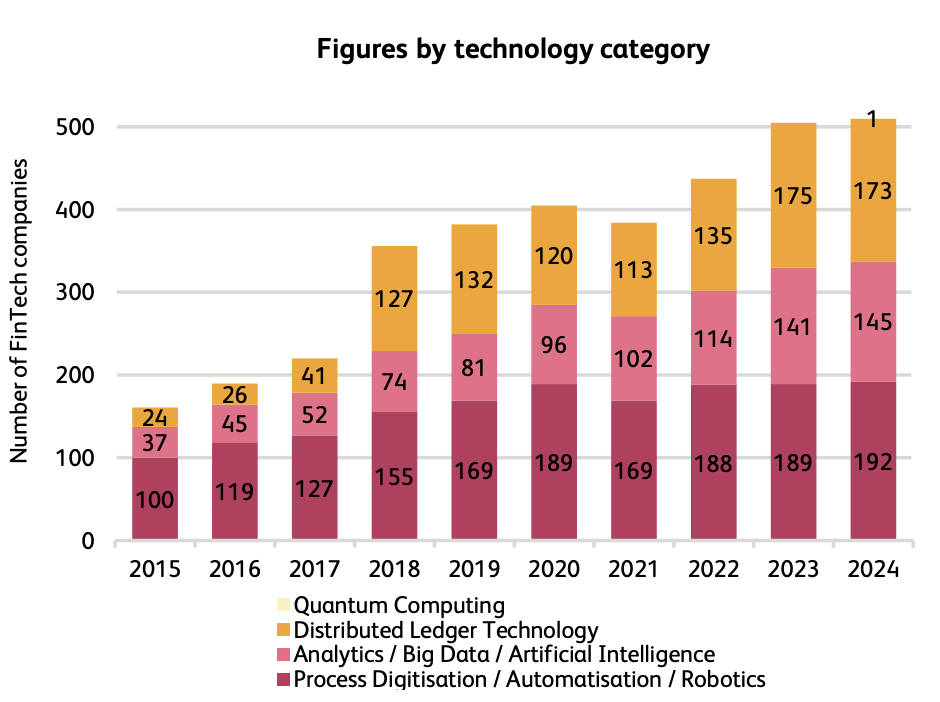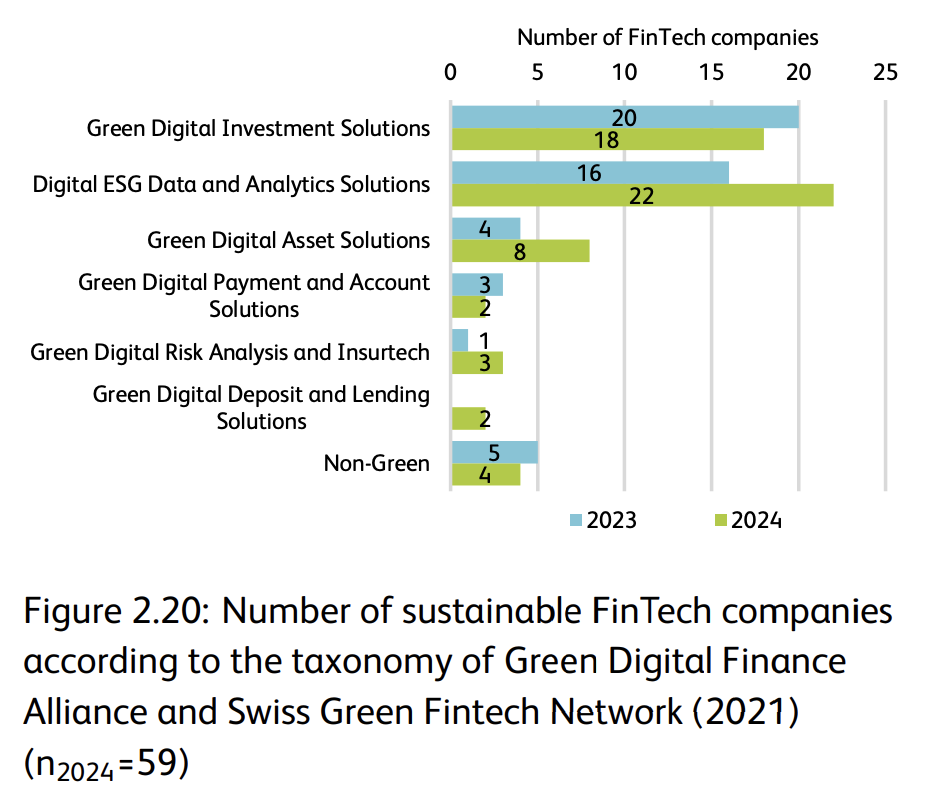Switzerland’s fintech industry is showing signs of saturation, with the number of companies comprising the market stabilizing. However, growth opportunities remain, particularly in international markets and emerging verticals such as sustainable finance, according to the latest IFZ Fintech Study by the Institute of Financial Services Zug (IFZ). Switzerland’s fintech industry stagnates The 2025 IFZ Fintech Study, released in March 2025, shares the latest advancements in the Swiss and Liechtenstein fintech sector, sharing emerging trends and key developments. According to the report, the Swiss fintech industry has reached a plateau in terms of the total number of companies. At the end of 2024, the market comprised 483 fintech companies, the same number as a year earlier. Although new players
Topics:
Fintechnews Switzerland considers the following as important: fintech industry, switzerland, Various
This could be interesting, too:
Fintechnews Switzerland writes Adnovum Announces Board Changes: Adrian Koch Steps Down, David Brodbeck and Reto Isenegger Join
Fintechnews Switzerland writes Top 10 Fastest-Growing Fintechs in Europe for 2025
Bitcoin Schweiz News writes Federal Council strengthens Switzerland as a blockchain location
Bitcoin Schweiz News writes Bitcoin-Studie der Hochschule Luzern: Schweizer setzen auf Revolut, Swissquote und Binance
Switzerland’s fintech industry is showing signs of saturation, with the number of companies comprising the market stabilizing. However, growth opportunities remain, particularly in international markets and emerging verticals such as sustainable finance, according to the latest IFZ Fintech Study by the Institute of Financial Services Zug (IFZ).
Switzerland’s fintech industry stagnates
The 2025 IFZ Fintech Study, released in March 2025, shares the latest advancements in the Swiss and Liechtenstein fintech sector, sharing emerging trends and key developments.
According to the report, the Swiss fintech industry has reached a plateau in terms of the total number of companies. At the end of 2024, the market comprised 483 fintech companies, the same number as a year earlier. Although new players entered the market in 2024, the same number of companies exited due to liquidations, mergers, or shifts away from fintech activities, resulting in no net growth for the sector.
This stagnation has been visible since 2019. After experiencing the strongest growth between 2017 and 2018 when the total number of fintech companies surged from 220 to 356, growth slowed considerably with the total hovering between 356 and 437 through 2022.
These findings suggest a potential market saturation, where domestic expansion opportunities are becoming increasingly limited.

A focus on implementation
Market saturation is further underscored by a shift from innovation to implementation, with Swiss and Liechtenstein fintech companies increasingly transitioning from pure innovation to the practical implementation of advanced technologies.
Notably, the adoption of artificial intelligence (AI), distributed ledger technology (DLT), and high-performance sustainable computing is outpacing more traditional process digitization, automation, and robotics solutions.
This suggests that firms are moving beyond prototyping to deploy advanced technologies that meet real-world market demands, comply with regulatory standards, and address evolving customer expectations.
Over the last decade, the analytics, big data and AI category has expanded rapidly, rising from 37 to 145 companies, with particularly strong growth since 2020. DLT also experienced rapid early growth, surging from 41 companies in 2017 to 173 in 2024. Another notable recent development is the emergence of the first fintech company in the quantum computing category in 2024.
Conversely, the technology category of process digitization, automatization and robotics grew relatively steadily from 100 companies in 2015 to 189 in 2020, but stalled from there, reaching 192 in 2024.

A shift towards international markets and B2B fintech
Despite market saturation, the study found that growth opportunities still exist, especially in international markets and in the business-to-business (B2B) sector. This response reflects Swiss and Liechtenstein fintech companies’ adaptation to limited domestic expansion prospects.
At the end of 2024, B2B fintech represented the largest segment of Swiss and Liechtenstein fintech companies, comprising 295 firms, or 58% of the total. Companies serving both business and consumer customers (B2B and B2C) followed with 184 companies, comprising 36% of the total, while business-to-consumer (B2C) companies remained a minority, with only 32 companies or 6% of the total.
These results present a sharp contrast to 2015 when B2B and B2C companies held the largest share at 42%, followed by B2B-focused companies at 36%. By 2020, a shift occurred as B2B companies increased their share to 52%, becoming the dominant category.
Geographic orientation further highlights that international shift. In 2024, 414 companies or 81%, were internationally focused, demonstrating the sector’s significant emphasis on expanding beyond domestic markets. Conversely, only 97 companies, or 19% of the total, were nationally focused.

Sustainable fintech as an emerging fintech vertical
Another key trend highlighted in the report is the rise of sustainable finance, a development that’s reflected in the rapid growth of the vertical.
Between 2022 and 2024, the total of number of sustainable fintech companies in Switzerland and Liechtenstein grew significantly, rising from 32 in 2022 to 59 in 2024. This represents an 84% increase over two years, underscoring the sector’s expansion. This growth outpaces the broader fintech sector, which grew by only 17% between 2022 and 2024. As a result, the share of sustainable fintech companies within the industry increased from 7% in 2022 to 12% in 2024.
Within the sector, distribution has also evolved. Digital environmental, social and governance (ESG) data and analytics solutions grew from 16 companies in 2023 to 22 in 2024 to become the largest category last year and surpass green digital investment solutions, which had 18 companies. This growth underscores the increasing importance of data-driven ESG insights, regulatory reporting, and sustainability analytics, as financial institutions deepen their integration of ESG considerations into business operations.
Companies focusing on blockchain-based sustainable finance within the green digital asset solutions category also experienced significant growth, doubling from 4 companies in 2023 to 8 in 2024. This suggests growing adoption of blockchain technologies for sustainability purposes, such as green tokenization and tokenized carbon credit trading.
The category green digital risk analysis and insurtech also expanded, rising from one company in 2023 to three in 2024, while a new category, green lending and deposit solutions, emerged with 2 companies last year, signaling the growing prevalence of sustainable financing models, including green loans and impact-driven credit solutions.
Conversely, the green digital payment and account solutions category saw a slight decline from 3 companies in 2023 to 2 in 2024, indicating slower development or reduced market traction in this segment.

Following global fintech trends
Fintech trends in the Swiss fintech sector reflects global developments. Despite year-over-year (YoY) declines in enterprise fintech funding in 2024, the sector showed resilience and continued to dominate fintech investment.
According to a PitchBook report, enterprise fintech companies captured 64.4% of total fintech venture capital (VC) deal value in Q4 2024 and 59.5% for the full year. This indicates that investors continued to favor B2B fintech models.
Enterprise fintech companies raised a total of US$17.4 billion in VC deal value across 1,250 deals in 2024, representing YoY declines of 33.4% and 16.9%, respectively.

Similarly, Switzerland’s sustainable fintech sector is following global trends. In 2024, climate fintech investments reached US$2.7 billion, up 17% YoY, according to a new report by CommerzVentures, the corporate VC arm of German banking group Commerzbank. This growth outpaces the broader fintech sector, which, according to CB Insights, declined by 20% YoY.

Featured image credit: edited from freepik
The post Though Switzerland’s Fintech Sector Faces Saturation, Opportunities Still Exist in B2B and International Markets appeared first on Fintech Schweiz Digital Finance News - FintechNewsCH.
